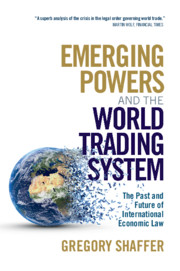Book contents
- Reviews
- Emerging Powers and the World Trading System
- Emerging Powers and the World Trading System
- Copyright page
- Dedication
- Contents
- Figures
- Tables
- Preface: The Project and Its Methodology
- Part I Legal Capacity and Transnational Legal Orders
- 1 Introduction
- 2 The Theory: Building Trade Law Capacity in Emerging Powers and Its Implications
- 3 The Challenges of International Trade Law
- Part II The Cases of Brazil, India, and China
- Part III The Future of the Transnational Legal Order for Trade
- Acknowledgments
- Abbreviations
2 - The Theory: Building Trade Law Capacity in Emerging Powers and Its Implications
from Part I - Legal Capacity and Transnational Legal Orders
Published online by Cambridge University Press: 23 July 2021
- Reviews
- Emerging Powers and the World Trading System
- Emerging Powers and the World Trading System
- Copyright page
- Dedication
- Contents
- Figures
- Tables
- Preface: The Project and Its Methodology
- Part I Legal Capacity and Transnational Legal Orders
- 1 Introduction
- 2 The Theory: Building Trade Law Capacity in Emerging Powers and Its Implications
- 3 The Challenges of International Trade Law
- Part II The Cases of Brazil, India, and China
- Part III The Future of the Transnational Legal Order for Trade
- Acknowledgments
- Abbreviations
Summary
We live in a pivotal time for international economic law. Emerging powers have ascended in prominence and the United States and Europe declined as economic and trading powers. China has become a rival to the United States. Economists tend to explain the shift from the angle of efficiency and innovation, while political scientists in terms of power, and more precisely market and economic power. This book provides a necessary complement to these analyses by assessing changes in law and legal institutions, and, in particular, these countries’ development of trade law capacity, which is linked to broader policy capacity, to interpret, apply, develop, and shape the rules of the game.
- Type
- Chapter
- Information
- Emerging Powers and the World Trading SystemThe Past and Future of International Economic Law, pp. 22 - 57Publisher: Cambridge University PressPrint publication year: 2021



